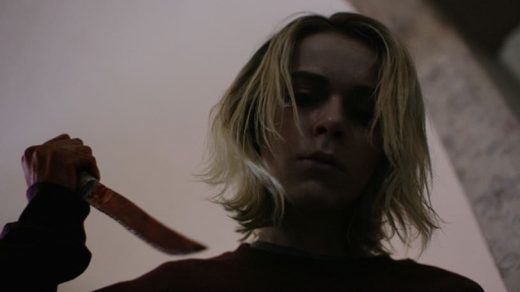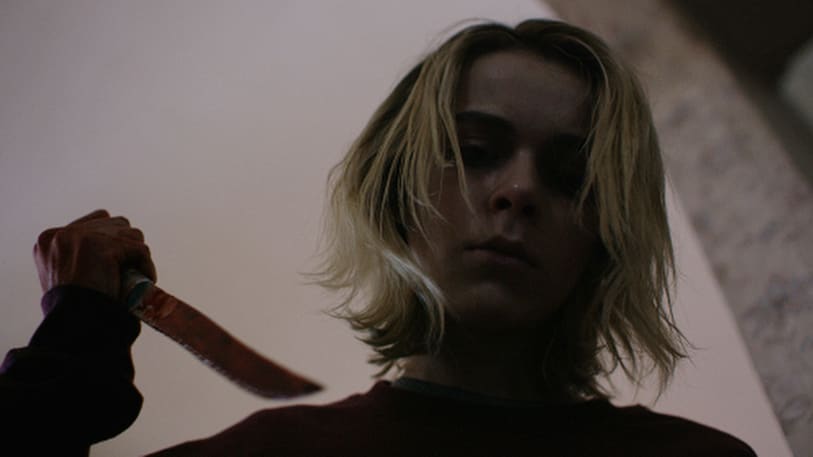The Blackcoat’s Daughter’ Director Oz Perkins On Why The Best Scary Movies Are Sad Movies
For someone who supposedly doesn’t “rush out” to see horror movies in theaters, Osgood Perkins has now directed two of the most unnerving and effective additions to the genre to come out in the last year.
Not that this should come as a surprise, given that his pedigree essentially foretold excellence before he began: he is the son of late actor Anthony Perkins, best known for playing Norman Bates in Psycho and its sequels. And for a time, Osgood (or “Oz,” as he prefers) tried following his father’s lead. As an actor, however, his roles in films such as Six Degrees of Separation and Legally Blonde lacked the horror iconography that households eventually associated with this father.
But as a director, Perkins may have finally found his stride. Though Netflix released his ghost story I Am the Pretty Thing That Lives in the House several months ago, The Blackcoat’s Daughter is actually his directorial debut—and a damn good one all around, famous father or not. Once called February during its festival run until A24 picked it up for distribution, the film centers on a pair of schoolgirls (Kiernan Shipka and Lucy Boynton) left behind at their empty upstate New York boarding school for winter break. Meanwhile, a third young woman (Emma Roberts) makes her way up to the school for unknown reasons. When the storylines finally intersect…well, it’s an impressive twist best experienced firsthand.
If you take Perkins’ films side by side, “observational” and “slow burn” might come to mind—precisely the words he used as guiding principles for directing. More atmospheric than sensational, the two films are less interested in jump scares than in ruminating upon the human condition and the inherent vulnerability of its central characters. The Blackcoat’s Daughter is especially humane, as much a sad story as it is a scary one by the time the credits roll.
Fast Company had a chance to speak with Perkins about The Blackcoat’s Daughter (available in select theaters and on demand starting today), as well as writing his first movie, the horror renaissance, and why he bothers adding more horror to an already-horrifying world.
Warning: mild spoilers below.
Fast Company: The Blackcoat’s Daughter came out second, but this is actually your first film. What inspired it?
Osgood Perkins: As simple as it sounds, I just wanted to write what I wanted to see. And it’s not that I’m especially a big horror movie person; I don’t rush out to see horror movies in the theaters. It’s more that I had a love for the more classical horror movies of the ‘60s and the ‘70s. I wanted to approach the genre from that place, with a little bit more of a humanistic, beautiful horror movie. I really started from there and the pieces started to fall in.
FC: This wasn’t the original title for the movie. How did the change come about and how do you feel about it now?
OP: The original title was February. I was thinking of this notion that a time can be a place, especially for people who have anniversaries or, in this case, negative anniversaries where you feel the approach of a time of year. But when A24 bought the movie at the Toronto Film Festival, they wanted to indicate genre a little more strongly than they could get out of that title. They suggested a couple titles that I couldn’t identify with at all. So I looked into one of the pieces of music that my brother [musician Elvis Perkins] wrote for the movie. It’s sort of a nursery rhyme and “the blackcoat’s daughter” was in there. And I liked the word “daughter” since this is about a child that’s abandoned and orphaned.
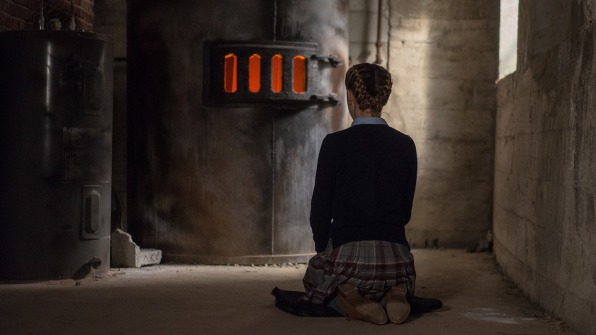
FC: Going off that: two years ago, A24 had a big success with The Witch. Other recent scary movies, such as The Babadook or It Follows, have been female-centric. In The Blackcoat’s Daughter, you focus on three women. What makes women such compelling leads for your movies?
OP: The two movies I’ve done have both been very feminine. Women, in general, have a heightened sophistication and contact with the invisible and what’s not tangible. Sometimes it’s called “feminine intuition,” but there’s a grounded sensitivity women possess that men just don’t. And if horror movies are all about what’s hidden and what we don’t know and what we can’t understand, I think the subtlety of the feminine is more . . . available. So I think it works better.
FC: Your last movie dealt with ghosts. Here, it’s the suggestion of demonic possession. Are those actual sources of fear for you?
OP: Both movies are horror movies only in their presentation. In the case of The Blackcoat’s Daughter, it’s meant to be a portrait of grief and loss and the space that’s left behind when you lose big. Demonic possession—or the suggestion of it—is the shadow that’s cast over someone who’s lost everything or the thing that comes to take the place of what you’ve lost. That kind of metaphor is strong as an abstraction. It would be difficult for me to make a movie or tell a story about grief and loss and have it just be that. I would never want to be talking about what I’m talking about. That becomes a bit plain. One of the cool things about horror is that you’re able to code the information you’re presenting. And the horror genre is rich with so many archetypes, symbols, weird codes, alphabets, and recognizable imagery that lends itself to that.
FC: A lot of recent horror films aren’t so much about just monsters anymore, not like Jeepers Creepers, for instance. Now, they’re trying to say something bigger: Take a look at The Babadook . . . did you see The Babadook?
OP: Yeah. I didn’t like it.
FC: But what it’s trying to say about motherhood—
OP: Yeah, I liked what it was trying to do.
FC: Why do you think this trend of metaphors and big messages seems to be coming back?
OP: When I wrote The Blackcoat’s Daughter, there was this feeling—it’s over now, but back then it wasn’t—this feeling that horror was this beleaguered genre, that it was getting kind of trashy and becoming a fast way to make money. And then the tide really turned. We’ve all kind of reconnected with the idea that horror movies are really about people and about death and all these big issues. And then you can have movies like Get Out, where it doesn’t even matter that it’s a horror movie. It has nothing to do with it. Get Out is not especially scary; it’s just fucking really clever. It’s really smart and it’s so deep. And it’s so great that the horror genre has sort of found its place again.
FC: For a while there, it was getting really meta. Maybe thanks to Scream.
OP: It got lazy. It got very popcorn-y, where you could guarantee that people would take their dates on opening weekend to go jump in their seats for a bit. And then the next weekend, no one would watch it. But these movies now have longevity.
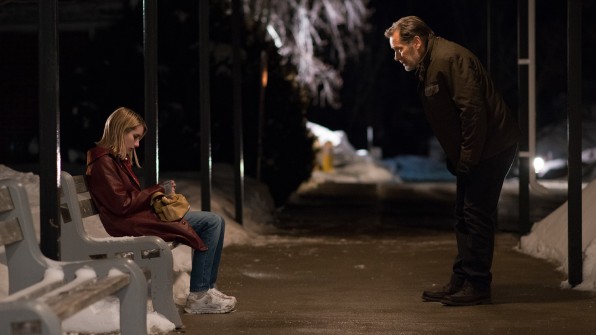
FC: So what movies influenced The Blackcoat’s Daughter, horror or otherwise?
OP: I became interested in this idea that good horror movies are sad people movies. Right around the time I first started writing this, I watched Let The Right One In and my friend Bryan Bertino’s The Strangers. And a movie as dark as The Strangers, there’s a darkness but there’s also a sweetness about life. Here are two people whose relationship is pretty much over, and they just want to spend their last night together….but they don’t get that. They’re going to die instead, and it’s a very sad thing. Let The Right One In is the same thing. Yeah, it’s a vampire movie, but it’s also young love that’s never going to work out. Those movies put together made me think, “Oh yeah, horror movies can be a sad thing.” Look at Carrie; she’s just a bullied girl.
FC: Most horror movies usually have vulnerable people at their center, going through some sort of profound sadness.
OP: Yeah. And even ghosts are sad! Elementally, that’s just a sad state.
FC: In this movie, though, Kat’s ailment is left ambiguous. It could be possession or it could be a breakdown. Why leave it unclear?
OP: Horror movies are best when you’re holding back what’s happening, when you’re obscuring the real nature of things. That’s why we go to see horror movies. We know we don’t know: we don’t know how we’re going to die, or what happens after death. And we go in with this uneasy feeling of not knowing. And to complement that experience, you don’t want to tell everybody everything.
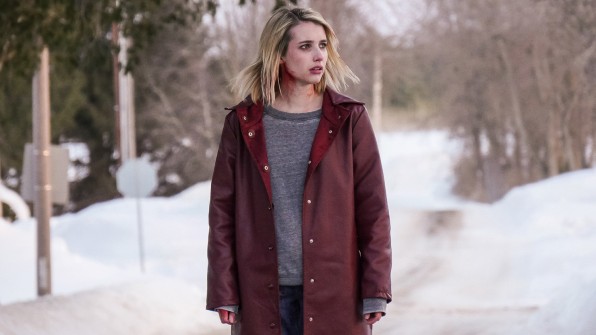
FC: Both your movies are pretty observational. They’re slow burns, rather than being full of jump scares. Why?
OP: For me, it’s more interesting and compelling. I don’t mean to force anyone’s attention, but one of the things that horror movies have going for them is that they really demand that the audience is present. Very few genres bring the focus of the audience to such a fine point. In the case of The Blackcoat’s Daughter, I wanted this quality of watching something happen, or knowing that something is going to happen, and knowing there’s nothing that you can really do to stop it. I didn’t want to rush into anybody’s face. I didn’t want to be too close to anybody while doing this. I wanted them to feel like they were watching something unfold. And there’s a certain undeniability to that, a non-negotiable quality that I find scary.
FC: How does your family history, your father in particular, affect the way you see horror? Does it make it more personal for you?
OP: My experience of my father was not uncommon for any children, or maybe sons of fathers. I didn’t feel like I knew him as well as I would have wanted to. He was a pretty secretive guy and my relationship with him was not a very rounded one. So like many people, when that parent dies, that becomes the time you start to wonder about them. And it’s this weird irony that as soon as they’re gone and can’t really be known in person, you start your work. For me, that really did happen. My second movie, I Am the Pretty Thing That Lives in the House, that’s 100 percent about my relationship with my old man. It’s just about looking for someone who’s no longer there, trying to find out more than you can. So the fact that my father is known for being a horror icon, it’s shorthand. It’s the shortest line between me and him if any part of my work is going to be about trying to figure him out better.
FC: So, a little bit bigger picture: It’s far to say the world is going through a weirdly bleak time. What’s your motivation for adding more horror? What place does it have in our world right now?
OP: Look, times are grim. But times have always been kind of grim. If you really look at our life today, waking up today, it’s not like when they were bombing London or during the Black Plague—something that was actually awful. Yeah, we’re in a fucked situation and a lot of the world is in a fucked situation and the future of the planet is pretty grim. But I think that it’s always been important—useful, even—to be able to have an artistic representation of what we go through. Just because we struggle and just because shit is sad and people die, that doesn’t mean that it’s not also a nice day. These movies I’ve made, I’m trying to make them beautiful and engaging as opposed to gruesome and repulsive.
FC: That’s very true. Your movies aren’t particularly gory.
OP: I’m not trying to terrorize anybody. I’m trying to look at it in a non-ugly way.

FC: Now narrowing the scope, what kind of lessons do you hope people might learn from the sadness of The Blackcoat’s Daughter?
OP: It really comes down to the end of the movie, where the monster is broken. And the monster has lost everything; the monster is now officially alone. And the fact that people have responded to that with, “Wow, I felt a bit sad for her even after everything she did,” that’s what the movie is about. It’s about being able to sit and be with someone who’s awful and understand there’s a sadness behind why she’s awful, which is always the case. The worst people are just upset.
FC: Makes you wonder how upset Donald Trump is.
OP: He’s really upset. He’s really afraid, obviously.
FC: Say he watched your movie. What would you want him to take away from it?
OP: Nope. I have no hope for that guy.
(48)

